Home » Jazz Articles » Interview » Julius Vasylenko: Seeing Stars
Julius Vasylenko: Seeing Stars
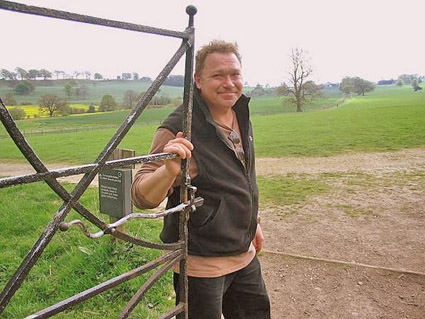
However, it feels a bit awkward, as he is like a big brother to me. A brusque, burly gent with curly hair, he has the air of the tough construction worker one could easily mistake him for— except for his precise, proper Limey enunciation—and indeed, he is very much the Limey, a survivor by wits that carried him across an ocean.
Born of an Italian mother and Ukrainian father, he still carries a smattering of the latter's language around with him, which he spoke as a child. "All it takes is the right key to open it up, and it floods out," he says. I ask him about the musical pun and, to be sure, it is not lost on him.
In fact, such a play on words is very much akin to the plays-on-notes he works out of his instruments; which include, in addition to the alto sax, a bamboo sax and a shower rod.
Vasylenko currently leads a number of projects, including Boston Lamb & Veal, with saxophonist Joshua Jefferson, and percussionist Andrew Eisenberg; and the duo Romulus and Remus, with Thomas Peri. Also, he participates in Dave Gross' pioneering all-free big band ensemble, Grizzler.
Equally at home in any of these contexts, and whether as a participant or leader, he goes beyond the call of duty, coming to the helm when a leader's work lapses or giving a leading role to others in his own ensembles. In the latter, he is mentor and tutor, shoring up and showing the way to those under his see.
His performances often begin with him as if he were at sea, without a clear direction, fragilely finding his way among his collaborators—but this is brief, and deceptive. Like a serpent—and his bamboo sax indeed resembles the medieval instrument of the same name—he feels out the styles of the other players and in no time is zooming into a zone of high energy harmonics, with the most human feel.
"That's the story of my life," he remarks, the story of a kid who rose from the hard streets of Bradford, West Yorkshire, UK. "Thatcher made me." Hard knocks brought him through the punk scene, a lingering glance afterward to the progressive and psychedelic dons of the '60s—through to the free jazz and post-jazz from which he now takes his cue.
His improvisations often climax with an almost song-like, peculiarly British crescendo, and when they end it is also in a peculiarly British way that he is about to reach even greater heights, but restrains himself out of seasoned propriety. This restraint is also poignant. It's as if there is more of a story he wants to tell, perhaps even of great grief but his Albion modesty cuts him off.
 In all, one gets the sense when they get to know his music that it is very much autobiographical, and feeling that, one wants to know as much about the man's story as one can.
In all, one gets the sense when they get to know his music that it is very much autobiographical, and feeling that, one wants to know as much about the man's story as one can.
"I was born blind," he said. "What this did to me, who can tell ... from birth, born blind. I still have to cope with that, I will never have full vision. I have a memory: I'm in my crib; I'm conscious of these bars on my crib. I would have to have been about 18 months, about two—pre-language. Whether this is a false memory or not, it is still very clear in my mind. I remember consciousness, I remember I would look out every night and see stars (of course I didn't have a name for them). I remember this sort of here-I-am-again feeling, and 'what is this I'm looking at?' It was like the firmament, it was like constellations—but it could have been a stigmatism when you see particles moving around in your eyes.
"So, this I remember going on every night, thinking, 'Here I am again.' I obviously didn't say that but I felt that. It's like feeling things before you know. They were distinctly yellow, the stars, although of course I didn't call them that. And I guess I used to cry a lot, though I don't remember that. So I'm lying in this crib, and I remember I am in this room with my parents' bed next to mine; and I remember this sort of dark, nameless shape—my father—and I remember this sort of dark power and this energy: my father. I had probably kept them up all night, after work, factory work. And I remember him coming up to me shaking the crib! Not a violent guy, just tired, me crying, and this was the last straw...I remember the sounds, too, this sort of gutteral 'roar!'
"No music around the house, apart from my mother singing Italian folk songs as she went about cleaning. I don't remember my father singing, but I'm not sure. Maybe, maybe...No, there was no encouragement in that direction; probably the opposite. I was very coddled. My parents would say, 'he'll never be a doctor or a lawyer, but maybe a shopkeeper'!
"I got sent to a partially-sighted school," Vasylenko added. "The way I discovered this, that I couldn't see jack shit (this was after the operation): every day a new kid in the class would change the calendar. And I knew my day was coming up, and I could not see the numbers on the calendar at all and I could not say that to anybody! It was a very oppressive atmosphere, this class—oh, I hated it. When it was somebody's birthday, they'd bring all their toys and just show the class what they'd got. And I couldn't believe that they would dare do that. I certainly couldn't believe they'd gotten all these toys—for one birthday? That's about six birthdays all rolled into one for me!
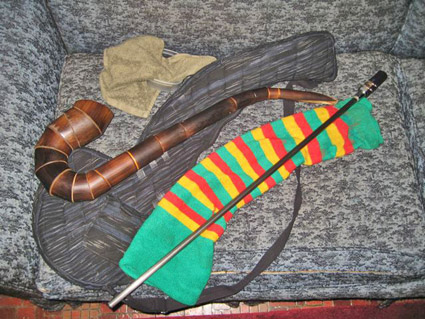 Julius Vasylenko's bamboo sax and curtain rod"And then on calendar day, I was seen as a complete idiot because I didn't know what day it was or what date it was and it was just because I couldn't see the damn thing. That stuck with me, you see. So right there you can see a lot of things: how I felt isolated, and alienated—and completely misunderstood. Right there at that early age you know you're not like anybody else, not just because you have a different name or background, you're just not the same, it's horrible. So I was sent to this school for the partially blind, Temple Bank; and what sort of strange amalgam of church and state is this name—'Temple Bank'?! As far as learning to read, I was fine, as long as the print was big enough...
Julius Vasylenko's bamboo sax and curtain rod"And then on calendar day, I was seen as a complete idiot because I didn't know what day it was or what date it was and it was just because I couldn't see the damn thing. That stuck with me, you see. So right there you can see a lot of things: how I felt isolated, and alienated—and completely misunderstood. Right there at that early age you know you're not like anybody else, not just because you have a different name or background, you're just not the same, it's horrible. So I was sent to this school for the partially blind, Temple Bank; and what sort of strange amalgam of church and state is this name—'Temple Bank'?! As far as learning to read, I was fine, as long as the print was big enough...
"Temple Bank was very small and had no resources," he continued. "It was sort of a catch-basin for all these problem kids, too. Many really interesting people—and even an albino Indian. Children other schools couldn't contain, because they were setting fire to books, and this was under the partially-sighted umbrella. No languages, no labs.
"But there were two new teachers coming in who wanted to take us on camping trips. And this is where it started, I believe—being out and hearing the sounds of nature. This was another pivotal moment, and hearing the sound of the running beck [brook], and this being this constant thing, day and night. So we're camping by the beck, and I'm hearing all these sounds, which I'm very attuned to. That, and being introduced to classical music—Beethoven was my first rock and roll. Five, six, seven and nine were very big influences on my when I was 10 and 11. And then the camping and the sounds of nature, the water, and of course, the bird song, too. This constant very delicate trance-like river sounds and bird sounds, and then just walking, hearing rocks tumbling and sticks breaking. I was very fit. Good build, good Ukrainian peasant stock.
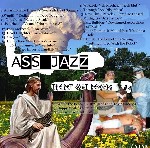 "I was very fit and indeed I wanted to go into physical education—and or languages so I could travel. So those were the early things...[Richard] Wagner's 'Ring Cycle.' It was so moving. There are parts where he's depicting nature just like Beethoven in the 'Pastoral' ['Symphony no. 6']. And the characters...And Tolkein's 'Lord of the Rings' was so simple and elegant; I don't know how many months it took me to read...I'm like 12—13 at this point. And what happens at the same time is that I've got these older cousins introducing me to progressive music, King Crimson, early Yes, Peter Gabriel's Genesis— music I didn't know existed! And it's absolutely incredible.
"I was very fit and indeed I wanted to go into physical education—and or languages so I could travel. So those were the early things...[Richard] Wagner's 'Ring Cycle.' It was so moving. There are parts where he's depicting nature just like Beethoven in the 'Pastoral' ['Symphony no. 6']. And the characters...And Tolkein's 'Lord of the Rings' was so simple and elegant; I don't know how many months it took me to read...I'm like 12—13 at this point. And what happens at the same time is that I've got these older cousins introducing me to progressive music, King Crimson, early Yes, Peter Gabriel's Genesis— music I didn't know existed! And it's absolutely incredible.
"Fear of institutions: hospitals," he said, changing tack. "This goes back a bit...So I was born blind and had this surgery, just to let light in a bit, through my pupils. In the beginning, there was darkness and let there be light! And the smell of hospitals. I still can't go in. It's better these days but that just stays with you. And I think that smell, of the senses, is the time traveler...I remember being dropped off at hospital, I didn't know I was going to be there for days, and I just turned around and my Mum had gone and there was a nurse! Made me a bit paranoid, I've already got a genetic persecution complex because of my father being chased around by Stalin, Uncle Joe's boys. That didn't help. I think that's important. There's a lot of distrust. And these classes, I was never taught to investigate properly, I was dismissed as like the idiots. And then everybody following the rules and being bland.
"So I'm into Beethoven and Wagner but what I haven't heard is classical music live. I had no stereo, just this old Radiogram, I don't know if you've ever seen one, its' like furniture, like a coffee table, really bad speakers built in. It's more for furniture than anything...But hearing Verdi's Requiem really stands out. There's this huge bass drum, and then, 'Bam Bam Bam!' That was great. That was rock and roll to me; and then the chorus—it was like this other dimension. And I got this idea, about 13 years old...This is really what music sounds like, feels like, smells like. And then Led Zeppelin, who I would put up with Wagner and Beethoven. I didn't see them live, but I did see Black Sabbath. These are two extremes, Verdi and Black Sabbath. I was very open-minded, I didn't see any distinction.
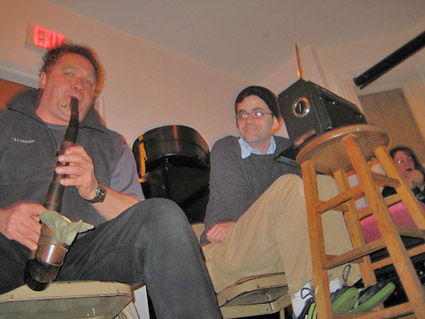
"I wasn't really political until I was out of school, and out of work—and then, what do you do? You had to find a way of living. You had to find a new family and a new community. So there was great bonding. There's great irony. People were sort of bonded together, thrown together—the void creates. It's like Nietzsche's 'hammer and anvil': you're either going to be broken or you're going to be the force and do things—and people did. You've got the coalminers striking, you've got your three-day weeks.
"John Peel was the prime minister as far as we were concerned. Tuning into Peelie, that's where we got our information. Not only was he playing people like the Pistols and The Clash and The Banshees, he was playing This Heat! And The Pop Group and The Slits—and dub!
"The other thing we used to do for a benefit, to get some money, is to put together a magazine, a 'fanzine,' DIY, get some money for printing costs and give them away free. My friend put together one about Margaret Thatcher, who became 'Maggot Hatcher,' the adventures of Maggot Hatcher.
"And then there was this overlap between doing electronic music and picking up the saxophone. My friend Mark, at a university the town over, chief engineer, was doing stuff with oscillators and various synthesizers. And we formed this band one night. Of course Mark had this studio. It's always been about access. There were a lot of different things going on at the same time. I was doing theater at Theatre in the Mill at Bradford University. And I was quite seriously getting into [Samuel] Beckett and [Harold] Pinter...It was OK for outsiders to be in the university. I was getting into acting in a serious way, but I couldn't stand the snobbery.
"Another example of having access, this tie-in and links with, and meetings with Genesis P-Orridge's Throbbing Gristle, and Cabaret Voltaire, sort of Sheffield electro scene, prompted by Pere Ubu, people doing this sort of post-punk weirder stuff that I was getting into. I started—at that point I didn't play anything—to do performance art, with a group called Counterdance. It stared with a typical industrial sound coming out of the speakers, like a great wall of sound. The singer was a 'Clockwork Orange' getup. I was a dangerous scientist/clown. I remember the white lab coat with stuff spilled on it, probably beer! Clown's mask. And I was up this ladder, showing Playboy centerfolds to the audience. And shooting them through a toy gun, which I had set fire to. It got pretty bad at one point—bad in a good way. I was on the floor being kicked in the ribs. I got banned from the club, with which I later made amends.
"I decide to put my own shows on at Theatre in the Mill, a series called 'Laughter is Revenge': 'You're not going to let me down, I'm going to do my own thing, spend my time being creative.' So everything was happening at once, rehearsing Beckett and Pinter, putting together these performances. I was influenced by the Situationists, the way they tried to disrupt monotony and order. I had this good one, jumping head first —diving—into trash bins. That was a good one. It disrupted things, caused a scene. Others would bring a pack of dogs into a shopping center (not vicious ones).
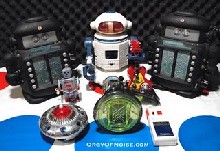 "I tried the saxophone once, and found it most agreeable! I was told by someone that for someone who had just blown into it for the first time, I had a remarkable affinity for it. I can't tell you exactly what I was doing, just blowing, probably. A sort of basement show, somewhere. I had stopped this sort of in-your face nihilst stuff. When you get older you get you want to be a bit more subtle...At one of these Laugher is Revenge shows, after I had just got my saxophone—you couldn't see it, it was in this tube, it was invisible, it had all these other tubes sticking out of it. The audience could just see me going into this tube, and playing. I was playing it through these electronic boxes so it didn't even sound like a saxophone. I felt very at home with that side of things. It's like what's hidden and under the surface is just as important as what's seen.
"I tried the saxophone once, and found it most agreeable! I was told by someone that for someone who had just blown into it for the first time, I had a remarkable affinity for it. I can't tell you exactly what I was doing, just blowing, probably. A sort of basement show, somewhere. I had stopped this sort of in-your face nihilst stuff. When you get older you get you want to be a bit more subtle...At one of these Laugher is Revenge shows, after I had just got my saxophone—you couldn't see it, it was in this tube, it was invisible, it had all these other tubes sticking out of it. The audience could just see me going into this tube, and playing. I was playing it through these electronic boxes so it didn't even sound like a saxophone. I felt very at home with that side of things. It's like what's hidden and under the surface is just as important as what's seen.
"It was a way of controlling what was seen and what was not seen, and I liked the way people weren't sure if I was even doing anything. You couldn't see the sax and you couldn't relate it to anything, really. The art was in combining and recombining and turning things inside-out and nothing being clear. This was going on while there were visuals going on and movement going on. Mark was there, Mark Bromwich...He's gone back to his original Polish name, Bokowiec. You can Youtube him and find out what he's doing now, with his wife.
 "And the library. It was there I found Stockhausen. And to find out Harry Parch existed—the hell with this establishment business, I'll do my own. And the minimalists, Terry Riley, Steve Reich, Philip Glass. I was getting more reductivist. What I was doing was too brash, too violent. I'm not violent by nature. [Lukas] Ligeti, too, [Krzysztof] Penderecki. Under the influence of all these people, I realized that I wanted to cull from a very deep source. Then Anthony Braxton appears, and I knew the sax had to be front and center. And Art Ensemble Of Chicago—that was fusion, to me, in its best possible sense. It's language, isn't it, so I'm getting into different languages, speaking in tongues, really—without any sort of initial training from anybody. I haven't had any lessons to speak of, I'm completely self-taught. It became obsessive. I was filling up this reservoir, combining things. It takes years to find a voice, of course.
"And the library. It was there I found Stockhausen. And to find out Harry Parch existed—the hell with this establishment business, I'll do my own. And the minimalists, Terry Riley, Steve Reich, Philip Glass. I was getting more reductivist. What I was doing was too brash, too violent. I'm not violent by nature. [Lukas] Ligeti, too, [Krzysztof] Penderecki. Under the influence of all these people, I realized that I wanted to cull from a very deep source. Then Anthony Braxton appears, and I knew the sax had to be front and center. And Art Ensemble Of Chicago—that was fusion, to me, in its best possible sense. It's language, isn't it, so I'm getting into different languages, speaking in tongues, really—without any sort of initial training from anybody. I haven't had any lessons to speak of, I'm completely self-taught. It became obsessive. I was filling up this reservoir, combining things. It takes years to find a voice, of course.
"The No-Wave scene from New York—James Chance, Lydia Lunch—it got me playing again, wanting to form a band, throwing the mask off and the lab coat—and still to be actually in your face; and to actually show the horn, take it out of its tube in the theatrical context. I was still in England, but it was a big prompt for me to go over there, which I did.
"I formed another band with my cousins, these great older cousins, that helped me at 12 and put me on the progressive path. The older cousin, Vic, picked up bass and played these great Bill Laswell-type lines. And the younger cousin, Eli, was doing Pat Place (of Teenage Jesus and the Jerks) type guitar, kind of jazzy but kind of not. No Wave had taught me to treat the sax like a grinding electric guitar, so I would throw in these hard-rock references, along with nods to various jazz styles, for example, the '60s Blue-Note style. And I've always thrown in ethnic references—that's the Art Ensemble of Chicago's influence. It might be sort of Balkan, Ukrainian, Gypsy music, even Japanese folk. Sometimes it's tongue in cheek. I've been known to throw in a few false endings, maybe a blues-inflected thing.
"I don't see the point in being just another good player. I would choose personality over mimicked technical prowess. It was weird in the beginning because I liked the mystery of not knowing what I was going to do. I didn't want things explained to me. There was a ritualistic aspect to what I was playing. It was a very personal thing. I knew the saxophone would be with me the rest of my life—though I knew it wouldn't be exactly how I make a living. It was already a part of my life. It was always going to be with me. Whether it was ritual, or therapy, or exorcizing demons, or a healing force, it wasn't going to be tainted by having to make a living at it. It was deeper than that. Consequently, I almost didn't want to learn how to play properly. I wanted to allow for this window, where the magic would happen."
Vasylenko finally escaped Thatcher's Europe, (after a traumatic incident where he lost his horn), setting up shop in New York City in the late 1980s. After two years of the club scene there, and people either loving or not understanding his accent, he traveled to California, which was the "real escape." The highlight of this, as he avers, was meeting Sun Ra, and getting his blessing, at an outdoor festival in Sonoma in natural amphitheater—wherein Sun Ra assured him his sax would come back to him in one form or another. "You never know," he said. "Just be open, and it might come back. You never know, but you know..."
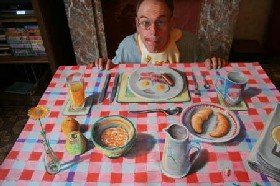 It did. A week after meeting the icon, he met a young woman in a used-clothing store, who was wearing a zebra-print top that matched his zebra jeans. She introduced herself as "Ra," short for Raziel; and invited him over and shared her collection of reed instruments. This was not ownership, but it heralded a long future of picking up many and various instruments of his own, the first of which was given to him by some skateboard kids. "It looked as if it had been run over by a lorrie," he says; but he straightened it out as best he could and it played. Years on, he has found and refurbished many left for trash. His bamboo sax he bought, though: they are made by a German expatriate located in Thailand and Vasylenko found a trove of them for sale in a shop in Rockport, Massachusetts.
It did. A week after meeting the icon, he met a young woman in a used-clothing store, who was wearing a zebra-print top that matched his zebra jeans. She introduced herself as "Ra," short for Raziel; and invited him over and shared her collection of reed instruments. This was not ownership, but it heralded a long future of picking up many and various instruments of his own, the first of which was given to him by some skateboard kids. "It looked as if it had been run over by a lorrie," he says; but he straightened it out as best he could and it played. Years on, he has found and refurbished many left for trash. His bamboo sax he bought, though: they are made by a German expatriate located in Thailand and Vasylenko found a trove of them for sale in a shop in Rockport, Massachusetts.
The early years of a major force...the hammer banging out a dream on the anvil of Thatcher's England, brought over to America, in a miraculous deconstruction of negative and positive ions. Vasylenko is shy about recording and distribution, to be sure; but he has a trove of archives going back to his years in the Sheffield scene, through to his many projects executed now in Boston. Recent excursions include a stint with a band at The Stone in NYC, and his drive and inertia ensure he will be on the scene for many years to come, reinventing himself and others.
Selected discography
Romulus and Remus, Four Pieces (2009)
Various artists, Ass Jazz, Vol. 1 (Pet Goat Records, 2009)
With Orgy of Noise, Bandwidth TV on CCTV (OrgyofNoise.com, 2008)
Photo credits
Page 1: www.myspace.com/julesvasylenko
Page 2: emptyhousecooperative.blogspot.com
Page 3: Top: farm4.static.flickr.com; Bottom: orgyofnoise.com
Page 4: Top: Lillian Schrank; Bottom: ww.myspace.com/breakfastatpenderecki39s
Page 5: emptyhousecooperative.blogspot.com
< Previous
Before You Go
Comments
About Julius Vasylenko
Instrument: Saxophone, alto
Related Articles | Concerts | Albums | Photos | Similar ToTags
For the Love of Jazz
 All About Jazz has been a pillar of jazz since 1995, championing it as an art form and, more importantly, supporting the musicians who create it. Our enduring commitment has made "AAJ" one of the most culturally important websites of its kind, read by hundreds of thousands of fans, musicians and industry figures every month.
All About Jazz has been a pillar of jazz since 1995, championing it as an art form and, more importantly, supporting the musicians who create it. Our enduring commitment has made "AAJ" one of the most culturally important websites of its kind, read by hundreds of thousands of fans, musicians and industry figures every month.






















